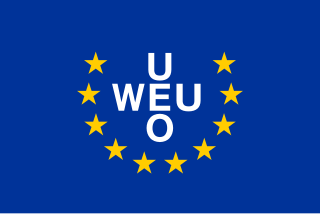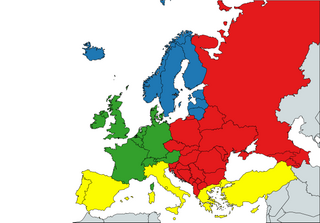The European Convention on the Recognition of the Legal Personality of International Non-Governmental Organisations is an international treaty that sets the legal basis for the existence and work of international non-governmental organizations in Europe. It was adopted by the member states of the Council of Europe, meeting at Strasbourg on 24 April 1986. It entered into force on 1 January 1991; signatory states were Austria, Belgium, France, Greece, Portugal, Slovenia, Switzerland and the United Kingdom. [1]
As of 31 May 2018, [2] the treaty has been ratified by Austria, Belgium, Cyprus, France, Greece, Liechtenstein, North Macedonia, Netherlands, Portugal, Slovenia, Switzerland, and the United Kingdom, and has been extended by the UK to Guernsey, Jersey, and the Isle of Man.

The Council of Europe is an international organisation established in the wake of World War II to uphold human rights, democracy and the rule of law in Europe. Founded in 1949, as of 2023 it brings together 46 member states, with a population of approximately 675 million; it operates with an annual budget of approximately 500 million euros.

The Western European Union was the international organisation and military alliance that succeeded the Western Union (WU) after the 1954 amendment of the 1948 Treaty of Brussels. The WEU implemented the Modified Brussels Treaty. During the Cold War, the Western Bloc included the WEU member-states, plus the United States and Canada, as part of the North Atlantic Treaty Organization (NATO).

The Schengen Agreement is a treaty which led to the creation of Europe's Schengen Area, in which internal border checks have largely been abolished. It was signed on 14 June 1985, near the town of Schengen, Luxembourg, by five of the ten member states of the then European Economic Community. It proposed measures intended to gradually abolish border checks at the signatories' common borders, including reduced-speed vehicle checks which allowed vehicles to cross borders without stopping, allowing residents in border areas freedom to cross borders away from fixed checkpoints, and the harmonisation of visa policies.

The Copenhagen criteria are the rules that define whether a country is eligible to join the European Union. The criteria require that a state has the institutions to preserve democratic governance and human rights, has a functioning market economy, and accepts the obligations and intent of the European Union.
The European Patent Organisation is a public international organisation created in 1977 by its contracting states to grant patents in Europe under the European Patent Convention (EPC) of 1973. The European Patent Organisation has its seat at Munich, Germany, and has administrative and financial autonomy. The organisation is independent from the European Union, and has as member states all 27 EU member states along with 12 other European states.

The special territories of members of the European Economic Area (EEA) are the 32 special territories of EU member states and EFTA member states which, for historical, geographical, or political reasons, enjoy special status within or outside the European Union and the European Free Trade Association.

The Treaty of Accession 2003 was the agreement between the member states of the European Union and ten countries, concerning these countries' accession into the EU. At the same time it changed a number of points which were originally laid down in the Treaty of Nice. The treaty was signed on 16 April 2003 in Athens, Greece and it entered into force on 1 May 2004, resulting in enlargement of the European Union with 10 states.

Europe, the westernmost portion of Eurasia, is often divided into regions and subregions based on geographical, cultural or historical factors. Since there is no universal agreement on Europe's regional composition, the placement of individual countries may vary based on criteria being used. For instance, the Balkans is a distinct geographical region within Europe but individual countries may alternatively be grouped into Southeastern Europe or Southern Europe.
European integration is the process of industrial, economic, political, legal, social, and cultural integration of states wholly or partially in Europe or nearby. European integration has primarily come about through the European Union and its policies.

The Prüm Convention is a law enforcement treaty which was signed on 27 May 2005 by Austria, Belgium, France, Germany, Luxembourg, the Netherlands and Spain in the town of Prüm in Germany, and which is open to all members of the European Union, 14 of which are currently parties.

The European Union (EU) is a political and economic union of 27 member states that are party to the EU's founding treaties, and thereby subject to the privileges and obligations of membership. They have agreed by the treaties to share their own sovereignty through the institutions of the European Union in certain aspects of government. State governments must agree unanimously in the Council for the union to adopt some policies; for others, collective decisions are made by qualified majority voting. These obligations and sharing of sovereignty within the EU make it unique among international organisations, as it has established its own legal order which by the provisions of the founding treaties is both legally binding and supreme on all the member states. A founding principle of the union is subsidiarity, meaning that decisions are taken collectively if and only if they cannot realistically be taken individually.
The Assembly of European Regions (AER) is the largest independent network of regions in wider Europe. Bringing together regions from 35 countries and 15 interregional organizations, AER is a forum for interregional cooperation.

The Schengen Area is an area comprising 27 European countries that have officially abolished many passport and many other types of border control at their mutual borders. Being an element within the wider area of freedom, security and justice policy of the European Union (EU), it mostly functions as a single jurisdiction under a common visa policy for international travel purposes. The area is named after the 1985 Schengen Agreement and the 1990 Schengen Convention, both signed in Schengen, Luxembourg.

In the European Union (EU), enhanced cooperation is a procedure where a minimum of nine EU member states are allowed to establish advanced integration or cooperation in an area within EU structures but without the other members being involved. As of October 2017, this procedure is being used in the fields of the Schengen acquis, divorce law, patents, property regimes of international couples, and European Public Prosecutor and is approved for the field of a financial transaction tax.

The European Forest Institute (EFI) is an international organization established by the European states. It has 30 Member Countries, and c. 130 member organizations from 40 countries working in diverse research fields. EFI provides forest-related knowledge around three interconnected and interdisciplinary themes: bioeconomy, resilience and governance.
The Council of Europe Convention on the Protection of Children Against Sexual Exploitation and Sexual Abuse, also known as the Lanzarote Convention, is a Council of Europe multilateral treaty whereby states agree to criminalise certain forms of sexual abuse against children. It is the first international treaty that addresses child sexual abuse that occurs within the home or family.

Corruption in Switzerland describes the prevention and occurrence of corruption in Switzerland.

The Treaties of the European Union are a set of international treaties between the European Union (EU) member states which sets out the EU's constitutional basis. They establish the various EU institutions together with their remit, procedures and objectives. The EU can only act within the competences granted to it through these treaties and amendment to the treaties requires the agreement and ratification of every single signatory.